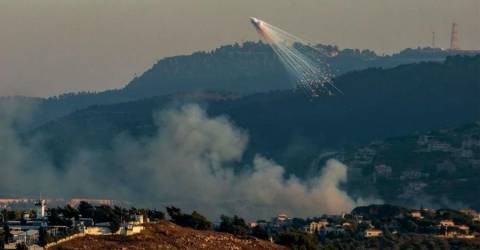Yemen’s Houthis promise massive response to Israeli attack that leaves six dead

Yemen’s Houthi rebels on Sunday vowed “massive” retaliation against Israel after a deadly attack on the port city of Hodeidah, as the regional fallout from the months-long war in the Gaza Strip deepens.
The Israeli attack, the first claimed by Israel in Yemen, came a day after the Houthis’ first deadly attack in Israel.
On Sunday, Israel said it had intercepted a rocket fired from Yemen and hit targets in southern Lebanon. Residents of the southern Gaza Strip reported fighting in the Rafah area.
The fighting across the region comes as Washington, Israel’s main arms supplier, says a deal to end the more than nine-month war between Israel and the Palestinian militant group Hamas is nearing the “finish line.”
But the Saudi Foreign Ministry warned that Israel’s attack on Hodeidah “exacerbates current tensions in the region and stalls ongoing efforts to end the war in Gaza.”
According to civil defense officials in the Hamas-controlled area, dozens of people have been killed across the Gaza Strip since Saturday, including in attacks on homes in the central Nuseirat and Bureij areas and near southern Khan Yunis.
Residents said a large-scale operation was underway in a district west of Rafah and reported heavy artillery shelling and clashes.
On Sunday, Abdul Malik al-Huthi, head of the Iran-backed group, said the attacks on Hodeida would lead to “further escalation and more attacks on Israel” after the Houthi’s deadly drone attack on Tel Aviv changed the rules of engagement and ushered in a “new phase” of operations.
Yahya Saree, Houthi military spokesman, had previously stated that “the rebels’ response to Israeli aggression against our country will be inevitable and massive.”
Israeli Defense Minister Yoav Gallant said the fire left by the attacks on the rebel-held port of Hodeidah “can be seen throughout the Middle East and its significance is clear.”
Gallant warned of further operations if the Houthis “dare to attack us” after the Houthis’ drone strike hit Tel Aviv, which is at least 1,800 kilometers from Yemen.
It was apparently the first drone to penetrate Israel’s complex air defenses. One analyst said the Houthi drones did not pose a “strategic threat” to Israel.
– Fuel storage tanks –
The Houthis control large parts of Yemen, including large parts of the Red Sea coast.
Six people were killed and 83 injured in Hodeida, health officials said in an updated statement carried by Houthi media.
Firefighters struggled to contain the major blaze caused by the strike. A port official said fuel tanks and a power plant were still burning on Sunday.
Analysts say the attack on Hodeida will likely only encourage the Houthis. Since January, the rebels have already withstood repeated attacks by the US and Britain aimed at preventing further Houthis from attacking ships.
Even a nearly ten-year war against the forces supporting the internationally recognized government of Yemen could not weaken the power of the rebels, although they were hit by thousands of air strikes.
However, Yemen expert Nicholas Brumfield said the attack on Hodeida would have a “devastating humanitarian” impact on ordinary Yemenis.
On Sunday, the Israeli military said it had intercepted a missile fired from Yemen at the Red Sea resort of Eilat. The rebel spokesman said ballistic missiles had been fired at the port.
In Lebanon, Iran-backed Hezbollah, an ally of Hamas, said it had fired Katyusha rockets at northern Israel after Israeli strikes hit a weapons depot and injured six civilians.
Hezbollah said Israel’s attacks on its allies in Yemen marked “a new, dangerous phase.”
– Netanyahu to Washington –
The Gaza war was triggered by the Hamas attack on southern Israel on October 7, in which 1,195 people, mostly civilians, were killed, according to a count by the AFP news agency based on Israeli figures.
The militants also captured 251 hostages, 116 of whom are still in Gaza. According to the Israeli military, 42 of them are dead.
With its promise to destroy Hamas, Israel has killed at least 38,983 people, mostly civilians, according to Gaza’s Health Ministry.
The war has displaced most of the Gaza Strip’s population, destroyed much of the infrastructure, including homes, and caused a shortage of essential goods.
Israel has begun vaccinating its troops in the Gaza Strip against polio and providing vaccines to the Palestinian population after health authorities said the virus had been detected in the area, the military said on Sunday.
A spokesman for the World Health Organization said on Friday that many other diseases are “spreading uncontrollably” in the Gaza Strip.
The war has brought Israelis, sometimes tens of thousands, into the streets to demand an agreement to release the remaining hostages.
“Bring them home,” protester Ofira Azrieli appealed to Prime Minister Benjamin Netanyahu in Tel Aviv on Saturday.
Netanyahu is scheduled to address U.S. lawmakers in Washington on Wednesday, where he will face pressure to reach a ceasefire with Hamas. He will meet with President Joe Biden on Tuesday, his office said.
bur-rsc/dcp/hkb/it



